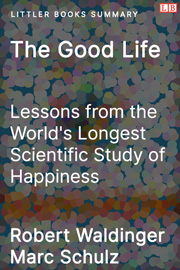Book Description
The directors of the longest scientific study of happiness ever conducted explains what makes a happy and healthy life.
If You Just Remember One Thing
Coming soon.
Bullet Point Summary and Quotes
- The Harvard Study of Adult Development is one of the longest and most comprehensive studies of adult life ever conducted. Started in 1938, it has tracked the physical and mental health of two cohorts of men for over 75 years.
- The first cohort consisted of Harvard sophomores. The second cohort consisted of disadvantaged inner-city Boston boys.
- Researchers collected medical data, blood samples, in-depth interviews, and questionnaires from the men (and later their wives) every two years. The study is still ongoing today.
- The major finding is the importance of relationships for well-being. Study members with strong social connections were happier and physically healthier over time.
- People with better relationships live longer and experience less mental decline.
- "Through all the years of studying these lives, one crucial factor stands out for the consistency and power of its ties to physical health, mental health, and longevity. Contrary to what many people might think, it's not career achievement, or exercise, or a healthy diet. Don't get us wrong; these things matter (a lot). But one thing continuously demonstrates its broad and enduring importance: Good relationships."
- Loneliness was identified as a key risk factor for health declines and depression.
- People in good relationships did not let physical pain affect their mood. People in bad relationships have their physical pain compounded with emotional pain.
- The quality of relationships is way more important than the quantity.
- Toxic relationships are harmful to health and happiness. A bad marriage is worse than getting divorced.
- The happiest people in retirement were the people who had actively worked to pursue new relationships.
- A recent survey shows that most young people want to be rich and famous. However, close relationships matter more for happiness than money or fame. Many study members achieved wealth and status, but those focused on prestige were less satisfied in later years.
- The best indicator of one's future well-being is the quality of their relationships, not social class, IQ, or biomarkers like cholesterol levels.
- Try to reevaluate your priorities in life. It can be transformative to shift your focus from external markers of success to harnessing deep relationships.
- Finding purpose and meaning in life contributes to happiness and fulfillment. Participants who found purpose in work, community, family, and helping others are happier.
- Engaging in activities that foster personal growth improves well-being. Examples:
- Pursue hobbies
- Learn new skills
- Practice gratitude and mindfulness
- Additional long-term studies with more diverse groups are needed, but the study's findings suggest good relationships are crucial to well-being regardless of race, gender, or background.
- Strong relationships take time. Invest in the people around you and replace cynicism with empathy to get the most from life.
- "Good relationships keep us healthier and happier. Period."
The Good Life: Resources
- Download this summary and 173+ other top nonfiction book summaries in one book (PDF, eBook, DOCX)
- Buy the book
